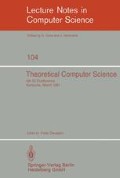Abstract
The paper is concerned with ways in which fair concurrency can be modelled using notations for omega-regular languages — languages containing infinite sequences, whose recognizers are modified forms of Büchi or Muller-McNaughton automata. There are characterization of these languages in terms of recursion equation sets which involve both minimal and maximal fixpoint operators. The class of ω-regular languages is closed under a fair concurrency operator. A general method for proving/deciding equivalences between such languages is obtained, derived from Milner's notion of “simulation”.
Preview
Unable to display preview. Download preview PDF.
References
Brzozowski, J.A. Derivatives of regular expressions. J. ACM 11, 481–494 (1964)
Büchi, J.R. Weak second order arithmetic and finite automata. Z. Math. Logik u Grund. Math. 6, 66–92 (1960).
Büchi, J.R. On a decision method in restricted second order arithmetic. Proc. Int. Congr. Logic, Method., Phil. of Sci. 1960. Stanford U. Press, 1962.
Choueka, Y. Theories of automata on ω-tapes: a simplified approach. J. Comp. Sys. Sci. 8, 117–141 (1974).
Ginzburg, A. A procedure for checking equality of regular expressions. J. ACM 14, 355–362 (1967).
Ginzburg, A. “Algebraic Theory of Automata.” Academic Press 1968.
Landweber, L. Decision problems for omega-automata. Math. Sys. Thy. 3 376–384 (1969).
McNaughton, R. Testing and generating infinite sequences by a finite automaton. Inf. & Control 9, 521–530 (1966).
Muller, D.E. Infinite sequences and finite machines. Proc. 4th Ann. Symp. on Switching Circuit Theory and Logical Design, 3–16. IEEE 1963.
Milner, R. An algebraic definition of simulation between programs. Proc. 2nd Int. Joint. Conf. on Artificial Intelligence. British Comp. Soc. 1971.
Park, D. On the semantics of fair parallelism. 504–526 in “Abstract Software Specifications” (Proc. 1979 Copenhagen Winter School) ed. D. Bjørner. Springer Lec. Notes in Comp. Sci. 86. (1980).
Rabin, M. & Scott, D. Finite automata and their decision problems. IBM J of Res. & Dev. 3, 114–125 (1959).
Salomaa, A. Two complete axiom systems for the algebra of regular events. J. ACM 13, 158–169 (1966).
Author information
Authors and Affiliations
Editor information
Rights and permissions
Copyright information
© 1981 Springer-Verlag Berlin Heidelberg
About this paper
Cite this paper
Park, D. (1981). Concurrency and automata on infinite sequences. In: Deussen, P. (eds) Theoretical Computer Science. Lecture Notes in Computer Science, vol 104. Springer, Berlin, Heidelberg. https://doi.org/10.1007/BFb0017309
Download citation
DOI: https://doi.org/10.1007/BFb0017309
Published:
Publisher Name: Springer, Berlin, Heidelberg
Print ISBN: 978-3-540-10576-3
Online ISBN: 978-3-540-38561-5
eBook Packages: Springer Book Archive

